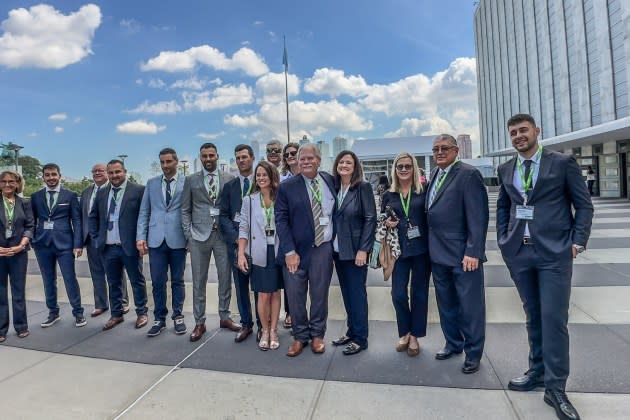BASF Invites Cotton Farmers to Discuss Regenerative Opportunity

As brands cater to mindful consumers, cotton produced under voluntary sustainability standards (VSSs) is rising, according to research showing that production of this kind of fiber—such as Better Cotton—has about doubled every two-and-a-half years since 2008.
But regenerative agriculture is still an emerging concept for some brands, and sustainably sourcing natural fibers poses challenges for other; cotton, in particular, is frequently accused of being a water-guzzling crop. This is why BASF Agricultural Solutions brought together a “global delegation” of cotton farmers last week, allowing them to voice their concerns and ideas for how to move forward.
More from Sourcing Journal
“BASF is dedicated to creating a better future for cotton production and the cotton textile industry,” Ray Daniels, seed sustainability manager at BASF, said. “We understand that cotton farmers are the cornerstone of sustainable production, which is why we are giving them an international platform to share their ideas on how agriculture must meet the needs of present and future generations through profitability, environmental health, and social and economic equity.”
Held at the United Nations headquarters in New York City on Sept. 12, “United for the Biggest Job on Earth” saw cotton farmers from Greece and the United States participate in a roundtable discussion with leadership from BASF on tackling the challenges associated with cultivating cotton sustainably. The farmers discussed how BASF can help create a better future for cotton production and the cotton textile industry, how regenerative agriculture practices aren’t one-size-fits-all, and how transparency and traceability are “paramount” to continued success.
Texas cotton growers Randy and Pat Smith welcomed the opportunity to shed light on their work cultivating sustainable, soil-friendly crops. “Consumers aren’t always aware of the effort growers like us put into regenerative agriculture practices, and we want to continue to share our story and gain their support,” they said.
BASF said the e3 Sustainable Cotton program supports cotton production in the United States, while the Certified Sustainable FiberMax (CSF) program supports European output. BASF’s e3 Sustainable Cotton program is an “unprecedented effort” to give enrolled farmers who commit to growing sustainable cotton additional economic support. At the same time, CSF is a PASF program for “superior, traceable and sustainable” cotton. Both give farmers “field-level traceability” for cotton and provide tools to track and gauge their cotton production’s environmental and social impressions.
“Agriculture is so central to our lives, but many do not consider the powerful impact it can have,” said Gustavo Palerosi Carneiro, vice president of BASF Agricultural Solutions EMEA & CIS. “It’s also an industry undergoing a time of unprecedented change. Farmers have an increasingly difficult yet important role of balancing the need for increased productivity, environmental protection and value to society.”
“United for the Biggest Job on Earth” is part of a partnership with the Conscious Fashion and Lifestyle Network, a United Nations-hosted online platform for industry to connect and accelerate the implementation of the Sustainable Development Goals.
